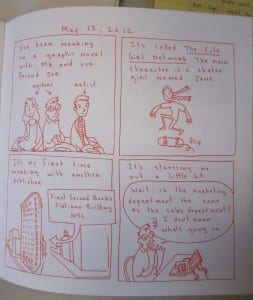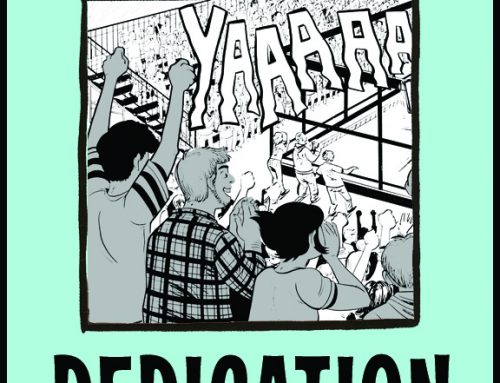test heading
I recently got an autobio comic from one of our authors which indicated that perhaps we weren’t making the distinction between sales and marketing clear enough. Sometimes these things are a bit difficult to parse — and it doesn’t get easier to understand when you realize that every publisher tends to handle the marketing/sales distinction differently.
So I thought I’d see if I could make this a little simpler!
Here’s the comic that was presented to me, done by (anonymous) author! I love the braids on the hair of skateboarding-Jane — they’re super!
So: WHAT DOES SALES A SALES DEPARTMENT DO?
First Second (publishing typically under twenty books a year) isn’t big enough to have a whole sales department to ourselves! So we share our sales team with our parent company, Macmillan. That means that our books are sold by the same sales people who are selling FSG, Henry Holt, St. Martin’s, Tor, Scientific American, Palgrave, W.H. Freeman, Picador, and a whole host of other publishers. And Macmillan distributes Papercutz, D&Q, and the manga imprint Seven Seas, so you can actually get a lot of different publishers’ comics from us.
The quick answer to ‘what does a sales department do’ is: sell books. The sales department is responsible for selling books to places that buy books — like bookstores and comics stores, but also museums, lifestyle stores (like a cooking store that would also sell cookbooks along with their pots and pans) and the like.
Macmillan is large enough that we actually have three sales departments! There’s a National Sales team, a Local Sales team, and a Special Sales team.
National Sales — this group of sales reps is responsible for large-quantity orders to stores that have locations all around the United States, but have just a single centralized buyer who decides what all of them will carry. That’s stores that don’t primarily carry books, like Target, Costco, Walmart, Sam’s Club, etc., and stores that do primarily carry books, like Barnes and Noble and Amazon — as well as book-based distributors like B&T, Ingram, and Follett. The sales team is responsible for liaising with these stores on a day-to-day basis to make sure that they have all the materials they need to make the right choices on which of our books to carry, where to shelve them, and how to promote them.
Local Sales — this group of our sales reps is responsible for visiting all the independent bookstores in the US that Macmillan has an account with and selling them books. There are about twenty of these local sales reps. They live all around the US, and they spend a lot of their time on the road, visiting stores and telling them about our titles. They also work with the stores to place their book orders, and make sure that the stores receive everything they order! They’ll convey any comments or questions stores have about upcoming books to us.
Special Sales — this group of sales reps is responsible for basically everyone else who would like to buy books from us. They handle things like selling our books to museum stores, to Urban Outfitters — to places that don’t always place a sales order with us every single season, but who will if there’s something that specifically suits them. They also work with the Scholastic Book Fairs and Clubs.
(We also have an International Sales team who’s responsible for selling the First Second books to English-Language bookstores around the world [not rights, but actually our editions], a Telephone Sales team who’s responsible for selling to any stores too inaccessible for our local sales team to reach, a Gift Sales team of reps who work on retainer and reach places like stationary stores and stuff, a Corporate Sales team who deals with any large orders for corporate events (like if your spot-welding company wanted to buy all its employees a copy of ‘The Last of the Great Spot-Welders’), and I think some more teams of sales people who don’t come up as frequently.)
Our Director of Sales also frequently comes to our scheduling, cover, and acquisitions meetings to weigh in on what we’re publishing and when. It’s always useful to know, for example, that stores are placing their Christmas orders in September, so we shouldn’t be publishing any seasonal books later than that (here’s looking at you, Adventures in Cartooning Christmas Special!).
WHAT DOES A MARKETING DEPARTMENT DO?
If you think of a sales department as the people who are going to all those stores and selling the books, what the marketing department does can be explained as putting together all the material to make those sales happen. What does that mean on a practical level?
The first reason that books sell is always because they’re really good!
But the second through tenth reason that books sell is because people know about them. And the more that a marketing department can do to make people know about the books their company is publishing (and then let their sales department know about all the marketing that’s going on so they can tell the stores they work with), the more a bookseller or a librarian or a teacher or a reader is likely to say, ‘okay, sign me up!’
That means that the Marketing Department will be dealing with things like: advertisements, promotional materials (like bookmarks or posters or buttons), working with teachers and librarians, the company website, the company twitter and blog and facebook, organizing author events, pitching media (ie, getting your book reviewed or getting you featured in magazines or newspapers or on the radio or online), any conferences that the company goes to (industry shows like the American Library Association conference, but also New York Comic-Con), and catalogs.
On top of that, they’ll work with the Editorial Department to make scheduling decisions (‘hey, that book’s coming out in the spring, and the author lives in Toronto — let’s publish it in May so that it’s out for TCAF’ ) and cover decisions (‘that book is likely to get shelved spine-out, so let’s make sure the spine is as bright and exciting as possible’) and acquisition decisions (‘there’s a lot of enthusiasm for creative nonfiction texts right now, and this book could reach that market’).
And they’ll also work with the Sales Department to make sure that they’re aware of all that’s going on in marketing for specific titles — as well as making sure that anything that would specifically be helpful for an account to sell books happens (like making a book trailer for Amazon).
Because First Second is tiny, our Marketing Department is composed of one person. But our parent company, Macmillan Children’s, frequently steps in and lends us a hand — so we exhibit with them at some professional conferences, they may book a block of ads to get a lower rate and we’ll go in on that with them, and our company website is hosted centrally through them too. Etc.
Dear author — probably everything at our company is more labyrinthine than you expected, and this explanation probably didn’t help out with that! But don’t worry, it gets easier.





